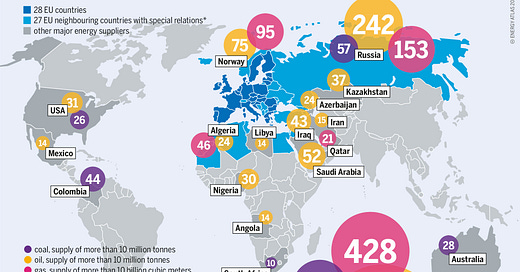While ‘more’ on the implications of the Coronavirus Crisis for the relationship between state and society is warranted, their continued discussion must wait due to other, equally pressing developments with respect to Europe’s winter worries.
In an earlier post I have outlined the follies that govern energy policy in the E.U. As of yesterday, gas prices in the E.U. have risen to approximately 1,200$ per 1,000 cubic metres, which corresponds to a year-on-year increase of some 440%, which is roughly equivalent to an oil price of 190$ per barrel, according to Bloomberg. In other words, prices for natural gas have never been so high, and the most worrisome aspect of it is that we’re only at the beginning of this winter’s heating season.
Now, we’ve already seen that Hungary’s Viktor Orbán is so far the only E.U. leader who’s acted on these aspects and arranged for a 15-year contract with Gazprom. This was a bold, clear-eyed, and above all clairvoyant move, which also puts to shame virtually all his counterparts in the E.U., as gas inventories are at historical lows and prices continue to surge. According to Russian media, gas storage facilities in the E.U. stood at 72% capacity as of 29 September 2021.
With prices continuing their upward movement, we now see at least some tentative movement (and I’m hesitant to call that a ‘restoration’, of sorts, of E.U. politicians’ sanity; given the absurdity of this all, I think ‘lucid moment’ is a more appropriate characterisation). For once, German media outlet Der Spiegel reported, yesterday at 11:57 p.m., that Spanish PM Pedro Sánchez proposed a common E.U. gas acquisition policy. To reduce the socially disruptive measures, Spain envisions a temporary reduction on VAT on natural gas, and France announced a similarly temporary cap on gas and electricity prices through April 2022.
Typically, such ‘interventionist’ activities are considered anathema by the E.U. Commission, but in this case, there may well be exceptions (doh). Also, rising gas prices will also be discussed at the upcoming E.U. summit on 21-23 October 2021, which will quite likely result in the use of creative verbiage when it comes to policy statements. Stay tuned on this one.
Still, the most captivating aspect of that Spiegel piece is that for once it does not feverishly call out Russia! Russia! Russia! in its listing of causes:
World market prices for natural gas have risen sharply in recent weeks. As a result, electricity prices have also risen in many countries. Spain, Italy and France are particularly affected. Economists see the cause in the economic recovery after the Corona pandemic, maintenance problems in the production and pipeline infrastructure as well as an increasing hunger for energy in Asia.
This is certainly a qualitatively ‘better’—read: objectively more true—characterisation of the problem. Do keep in mind that it may well be that, driven by necessity, E.U. leaders may actually do something useful for their peoples. While their inclination may well be to buy liquified natural gas from the U.S. at extortionately high prices, neither supply nor logistics are in place in Europe to render this a viable way-out in the short term.
If the only realistic way out—to buy more gas from Russia, and to do so prontissimo—is not taken, people will get cold and hungry before too long, and hence potentially rebellious (although I’m not holding my breath on that one). Still, this is a workable proposition, and the only thing standing in its way is the E.U. Commission’s folly of ‘libealising’ the bloc’s energy ‘markets’ masquerading as economic policy.
There is still time and the logistical prerequisites are all in place: NordStream 2 has been completed, but at this time, it is blocked from operating at full capacity due to E.U. absurd ‘unbundling’ rules. There is also the trans-Belarusian Jamal Pipeline, which is currently operating at 29% capacity, as reported by Russian media three days ago.
The alternative to reason-based pragmatism may well be that tens, if not hundreds, of millions of people will be very uncomfortable this winter. How bad might things get? Well, here too, Russian media provides us with considerable insights into the minds at work at the German equivalent of FEMA, the ‘Bundesamt für Bevölkerungsschutz und Katatrophenhilfe’ (Federal Directorate for Population Security and Catastrophe Relief): in the embedded video, we can see a freezing person engaging in lifehacks to stay warm in the absence of a reliable supply of energy.
Note that even if you don’t read German, the images are telling.
We certainly live in interesting times, as the Chinese saying goes. Let’s hope this situation doesn’t take a turn for the worse, for that ‘future’ can also be observed today: Ukrainian gas storage facilities are at a mere two third of their capacity as of 29 September 2021, which means that there is an excessively high degree of likelihood that it will not be enough.
More on Ukraine, Hungary, and the implications of the latter’s natural gas deal with Gazprom will be provided in my next post.




